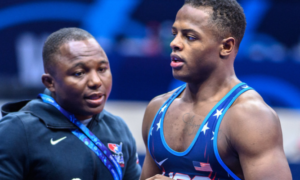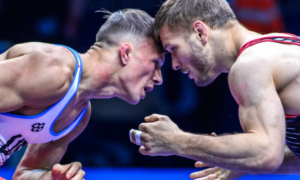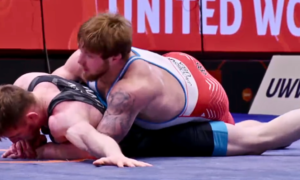They were just being honest. At the time, the four, young, United States Greco-Roman competitors were in Denmark beginning a two-week stay overseas. Not that the trip was something new. Earlier this year, they had spent time in Romania and Moldova, and that wasn’t new for all of them, either. This group, they are fast becoming wise to what is required for Americans to play catch-up in a wrestling discipline that enjoys much more attention elsewhere around the globe.
What happened is that Gunnar Hamre (63 kg, Combat WC), ’21 Fargo champ Jeremy Bockert (63 kg, IGA), Cael Kahle (67 kg, Ringers), and Aidan Squier (72 kg, Scorpions) were all asked the same question: ‘What do your Danish partners think about how wrestling works in the US?’ In a way, their answers simply relayed the perspectives of their Danish counterparts. Maybe a little sugarcoating wouldn’t have hurt; then again, glossing over truths is not going to do much to educate those who are in the dark, indeed, about how disjointed America’s developmental system actually is when it comes to Olympic wrestling.
So, from the hip they shot, innocently enough. Serving almost as messengers in this isolated case. Squier’s response (Hamre’s, too) is likely to strike the biggest chord. His answer regarding what the Danes think about wrestling in the US? “They know that Greco wrestling in the US is really bad and that there isn’t much good coaching specifically for Greco.”
Ouch.
Whether or not Squier’s volley is construed as accurate, one part with which few can quibble is that there aren’t enough good coaches for Greco in the US. Because if there were, it would not be a red-alert priority for four high schoolers to collect passport stamps. This small delegation of age-groupers — as well as many others who came before — understand full well that the next-level training they need is currently unavailable stateside. And until that changes, more trips, more bruises, and more time away far from home will remain a serious objective for youthful American Greco-Roman athletes who desire forging a fresh narrative.
Denmark Camp 2022 Q&A
Gunnar Hamre (63 kg, Combat WC)
Jeremy Bockert (63 kg, IGA)
Cael Kahle (67 kg, Ringers)
Aidan Squier (72 kg, Scorpions)
5PM: What do your other friends back in the US, who don’t wrestle Greco, think of your traveling overseas?
Gunnar Hamre: A lot of my friends think it’s really cool and wish that they could do it, as well; but they don’t understand how much work you have to put in while you’re there and how much work it takes to get there.
Aidan Squier: My friends who don’t wrestle Greco think all the traveling I do is a little crazy — but they also think it’s pretty cool and wish they were able to travel like me.
Jeremy Bockert: Some of my friends say I’m very lucky that I get to travel the world while doing what I love to do.
Cael Kahle: They think that it is a good opportunity for Greco to get better in the United States.
5PM: What do your Danish partners think about how wrestling works in the US?
Bockert: The Danish partners say that we are messing with too many styles at one time and that there aren’t enough opportunities for Greco.
Hamre: A lot of my Danish partners think that the US isn’t very good at Greco, and that we don’t have that many good coaches to bring us to their level. Some of them also think it is crazy that many of us train multiple styles.
Kahle: The Danish partners that I have wrestled with think that wrestling in the US is easier.
Squier: They know that Greco wrestling in the US is really bad and that there isn’t much good coaching specifically for Greco.
5PM: What is the most difficult thing about traveling?
Kahle: Getting homesick and missing friends and family.
Bockert: Personally, the most difficult thing going on all of these overseas trips is adapting to the time difference and raising the money for these trips.
Squier: There isn’t much difficulty about traveling for me, I really enjoy it. But I would say what was most difficult when I first started taking long trips is that I would sometimes get a little homesick.
Hamre: Some of the more difficult things for me would probably be having to be sacrificing time with friends and family that I used to have. On the trips that I’m away for multiple weeks at a time, then I get homesick.
5PM: What gives you the most confidence when training and competing internationally?
Squier: I get my confidence training and competing internationally from training Greco year-round. And, after I stopped wrestling folkstyle I became more confident in my Greco techniques.
Kahle: My confidence wrestling and training internationally comes from knowing that we are the underdog and being comfortable fixing mistakes in my wrestling.
Hamre: One of the biggest things for me is when I went full-time Greco. After that, I felt a lot more confident in myself to perform better at this level, but one of the problems is the lack of competition in the US.
Bockert: I get more confidence knowing that we are training with the best in the world and getting to work with some of the best coaches, as well.

Listen to “5PM51: Lining up with Tanner Farmer” on Spreaker.
Listen to “5PM50: Mr. Fantastic Benji Peak” on Spreaker.
Listen to “5PM49: Robby Smith on coaching, fatherhood and mentors” on Spreaker.
SUBSCRIBE TO THE FIVE POINT MOVE PODCAST
iTunes | Stitcher | Spreaker | Google Play Music




















